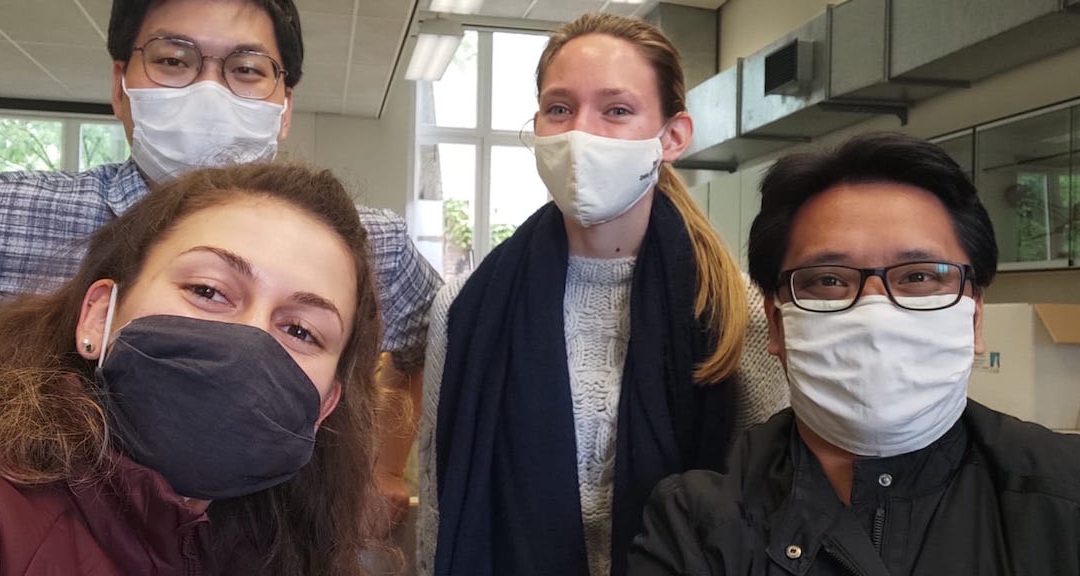By Dongjin (top-left), Emily (middle), Ronald (bottom-right) and Verdiana (bottom-left)]
In the recently concluded Leuven edition of the Living Lab, four Homo sapiens learned about macro-invertebrates from Gammaridae to Asellus and fishes from Gobio to Anguilla. Coming from different backgrounds, they worked together on the Water – Biotic team. Different voices, same MSc Sustainable Development program. Let us hear their stories.
Verdiana – International Studies, Italy

Verdiana holding a gudgeon, Gobio gobio, before weighing and measuring it and then releasing it in the Dijle, May 2021 © SUSDEV
Getting to this edition of the Living Lab was a bumpy road, including, you know, the usual pandemic and change of location, from the southern part of the African continent to… our very own Leuven. Jokes aside, I was positively surprised by how much fun and how fulfilling this living lab experience has been. My bachelor is in political science, and I have zero experience with the mysteries of science. I joined the water group out of curiosity for all the little forms of life presented to us back in February 2020, as well as to challenge myself to step outside the social science comfort zone. Biotic water sampling was the first activity for my cluster, and I was a bit worried about being in charge so soon, not entirely sure what I was doing myself. But everyone was so excited about getting their hands wet and dirty, wading the river looking for fishes and macro-invertebrates. It has been like going back to the good old days when we were little, exploring nature and letting it marvel us. After more than one year working from home, going outside experimenting in the field with an enthusiastic group of people was refreshing, both physically and metaphorically. Each contribution was valued, no matter the level of expertise in biology and ecology. What I will bring home with me is the light in the eyes of our supervisors, so passionate about their job and excited about explaining things and getting us interested. And, of course, the importance of making bold choices and being 100% there to experience them.
Ronald – Environmental Science, Philippines

Ronald (right) Kick-sampling for macro-invertebrates in the Dijle river, May 2021 © SUSDEV
Coming from an Environmental Science background, I have some experience in fieldwork, especially in aquatic ecology. However, after I completed my bachelor’s degree, my career has led me primarily towards roles in corporate sustainability. It is then quite refreshing to return to the field after a decade of doing sustainability within office walls. Digging through the soil, wading in the rivers, and walking through the forests of Leuven gave me a better appreciation of the area’s natural environment. On a personal level, I found Living Lab to be a great experience of the on-the-ground scientific work needed to better understand sustainability issues, as well as a reminder of what, as sustainability students and practitioners, we are trying to conserve. And that, regardless of whatever sector we end up joining post-Master’s, putting theory to work adds a meaningful perspective to sustainability.
Emily – Biology, Belgium

Emily (right) identifying the macroinvertebrates, May 2021 © SUSDEV
I was excited for the Living Lab fieldwork as I already performed some fieldwork during my bachelor Biology. I very much enjoyed the practical part, really going into the field, sampling fish and macroinvertebrates, being outdoors – even when the weather was not always as pleasant – as it feels so different from other things we usually do in our programme. There were some moments where I again felt like a real biologist, e.g. during identifying the species, however this time it was an even more enriching experience as we did the fieldwork with a multidisciplinary group. It was nice to see how people from different backgrounds joined forces, and how enthusiastic everyone seemed to be! The different perspectives are especially important and by working together, we can tackle greater challenges.
Dongjin – Geography, South Korea
Water flows from the high to the low. Water begins from a small portion of droplets and ends in the endless ocean. Water has always been the entity where I have found myself comfortable and natural. However, there were no living organisms in the world of my water because I saw water from the view of geography, which is the field of non-living things. The Living Lab brought me to the sampling of living things that reside in the world of water. Regardless of their identity, they all have been the equal organisms that live and die in the shelter where water flows slowly and oxygen is abundant. There are some details such as statistical validity of sampling data but the fundamental of the research is simple; the living things below surface go through life cycle just like us. They are born, grow, love, live and die. This Living Lab has been the time of deepening such understanding about water and the lives who live in water.

Dongjin (in red) sampling macroinvertebrates in river system, May 2021 © SUSDEV
Like tributaries to a river
No single sample of water is identical to another, no single voice rang quite the same. Yet, each and every story talks of learning, discovery, understanding, passion. The team, four of us, truly have immersed in this experience like we did in the waters running through Leuven. We emerged with a renewed understanding of the diversity and importance of life in water. Hopefully, this will enrich our future as agents of sustainability. Sustainability flows in the streams of the human heart.
< Back to 2021 Living Lab blog
